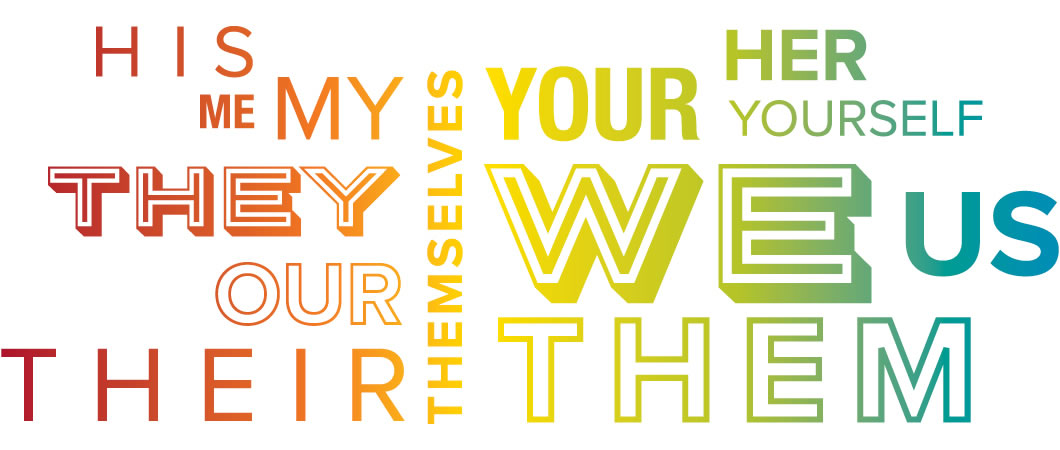College News
More Than Words
Inclusive language works when talk gives way to action.
SPOKEN LANGUAGE IS ALWAYS EVOLVING. FINDING new definitions for old words is almost a teenage rite of passage—take groovy, rad, cool, sweet, tight, even bad (not bad meaning bad, but bad meaning good), which have all become common ways to ascribe positivity or goodness to something. As of this writing, good is also “lit,” but that could change in three, two …
Along these same lines, the growing trend toward inclusive language is almost old news in some circles of society, especially in spoken language. In academic environments, it’s not unusual for people to introduce themselves by their names followed by their preferred pronouns (“my name is …, my pronouns are …”). But a few moments spent outside of academia remind us that the rest of the world may not be on the same page.
The Associated Press (AP) Stylebook and Chicago Manual of Style state that “they” can be used as a singular, gender-neutral pronoun in cases where a subject’s gender is unknown or where the subject prefers to be addressed that way. Individual reactions to this news (both manuals made the change recently) no doubt span a range as diverse as the gender spectrum itself, especially in non-academic circles. But inside the “Mudd bubble,” the reaction is more sanguine.
For Carrie, a Harvey Mudd student who uses they/them pronouns, the style manual change is not significant enough. “While it is helpful to have sources that society views as legitimate when someone is arguing that your pronouns are grammatically incorrect, I think the AP’s guidelines are too cautious to even be helpful in this way,” Carrie says, noting the explicit direction by the AP to write around the issue whenever possible.
Harvey Mudd Assistant Professor of Literature Ambereen Dadahboy sees the change as a welcome entrance into a conversation about inclusivity in language, but is dubious about a potential wider effect. “There are so many ways that the world around us, which is often created by language or discourse, doesn’t reflect our identities,” Dadahboy says. “So this is a way that we can signal, but we have to do more than just signal. Part of the problem that we’re experiencing is that we’ve done all the signaling for inclusion, but there has been no actual action that has made our world more inclusive.”
Steering discourse into action will take more than style manual changes, as the cultural shift necessary to handle the nuance of gender identity is only just beginning, though we already have ways to talk (and now write) about it. But there are signs of a shift.
Students applying to Harvey Mudd College will find that they can identify their gender in any way they choose on the application. “We used to provide a list of options from which they could choose, but the terms change so quickly it seemed safer to let the students identify themselves as they wish,” says Thyra Briggs, vice president for admission and financial aid at Harvey Mudd, noting that the College does still require students to identify as either male or female for sex.
On campus, inclusive action has taken shape in the form of the THEY/THEM club (Trans Home for Everyone [and You!] That Helps Every Mudder). Chartered in 2017, the club helps provide space for community building, connect students to resources and advocate on behalf of all Mudders without cis privilege. (Cisgender, or cis, is a term for people whose gender identity matches the sex they were assigned at birth.)
“A couple of my friends got the meetings started,” says Carrie, who is co-president of the club. “They recognized that ‘gendery’ people at Mudd needed community and connections to information and resources that we weren’t getting.” Carrie uses the term gendery as an umbrella term for trans/ non-binary/gender questioning/etc.
Open to all students regardless of gender identity, THEY/THEM membership currently stands at about 40 people. Carrie says, “We’re still getting new people showing up to meetings, and I’m excited about that.”
As a relatively new organization, THEY/THEM is still taking shape, its members figuring out what activities best serve its community. “We have weekly meetings where we talk about events the club is planning, events happening on other campuses that might be interesting and just generally how our lives are going,” Carrie says. Fundamentally, Carrie says, THEY/THEM is a community of students at Harvey Mudd, supporting each other through friendship.
“We are in such a privileged environment,” says Dadahboy. “When I’m interacting with ‘regular’ folks outside of this environment or outside of the environment I’ve curated on social media, I realize that we are in the minority. That doesn’t mean we’re wrong, we’re just working on these things here.”
